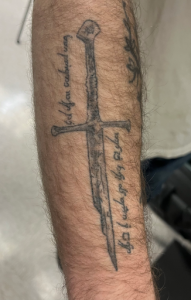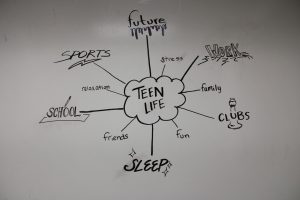Mental Health at a Glimpse
May 13, 2019
Mental illness. Even the phrase holds a negative connotation, yet it has become a part of the teenage experience. Maybe it was you, or it was your friend, or maybe it was a friend of a friend, that you barely knew.
Mental illness isn’t a universal experience. There are many different variations of why and how people face mental illness. There isn’t one strict way on why someone has a mental illness, but it does not mean that someone is broken or just stressed or simply a little down. The thing is, mental illness doesn’t care about what you have or don’t have in life, it’s like how someone can be diabetic regardless of what someone has because their body doesn’t produce enough insulin or some people need glasses and others don’t.
Like a number of students, I had everything I could want. I had a loving, healthy family, top grades, close friends, you name it. The problem was that as easy as it may have seemed, I was struggling on the inside.
It began when I was younger. For as long as I could remember I worried about nothing important. My parents could see how the panic attacks and isolation, because of my anxiety, started to evolve into a type of depression.
I wasn’t diagnosed as a second grader with these mental illnesses, but I did receive treatment. I saw a therapist and through silly games or drawing pictures of what scared me I was able to gain tools to deal with my anxiety.
I learned to take deep breaths (as useless as that might sound). I was told to take 5 deep breaths in through the nose and out through the mouth. It was a way of removing myself from an anxiety inducing situation and calming my nerves so I can wrap my head around what’s going on.
I learned what I personally needed to aid in dealing with my anxiety, which is a constant part of my life.Even now, nine years later, I have to reassess what tools I should use and be retaught about how to apply certain tactics.
I’ve returened to therapy to help me learn new tools. I learned to speak about what I was feeling. I couldn’t just say I was anxious anymore because my parents didn’t know what that meant which made me more anxious. It was a hard step, but it was important because while it took almost a decade, my family now knows to give me a little space to sort my mind out. They now understand that sometimes I don’t have a reason but that doesn’t mean I’m not trying.
The skills I learn evolve as I grow. I’ve learned to identify if the way I’m thinking during my anxiety attacks or depressive episodes is making it harder to pull myself out of it. Some of these signs include only focusing on the negative “what if’s” and believing everyone’s actions are a direct reflection of myself. While a few of these skills are tough things to hear, they are what I needed to understand to help reduce my feelings.
Even when writing these stories I found myself falling into the trap, I was trying to deny the fact I was overwhelmed. I thought I had control over how I would react and process everything I was taking in from the interviews I ran. After letting it sit with me for a few days, I realized I needed to talk to someone and express all of these built up emotions.
After having gone through the school’s process I was able to speak to Barbara Edwards, a psychologist at EHS. She helped me talk about some of the thoughts in my head regarding these stories and ultimately helped me feel comfortable going back to class.
Because of the limits within the school in terms of mental health, I had to further advocate for myself at home. The mental health team at school gave me a chance to access what I truly needed and led me to have a serious conversation with my parents. Since then, I’ve gone back to therapy to relearn how to address the thoughts in my head and how to talk about them in a productive manner. I learned that my thoughts weren’t something that made me crazy, they made me more human.
Even with all the support I’ve had and the treatment I still have days I zone out. I feel like I’m watching a movie where I’m the main character and all the events that are happening to me are happening to someone else. I’ve accepted sometimes needing more help to work through my emotions and understand them more.
I won’t be cured from my anxiety or depressive episodes, but I do know how to get help and how I can help myself work through certain issues.
I know I’m not the only one. Many of you have dealt with this as well. In your own way and in your own time. Each instance is different for every person, but the most important thing to know is that you aren’t weak for needing help, and as cheesy as it sounds, you’re strong for recognizing you might need some.






